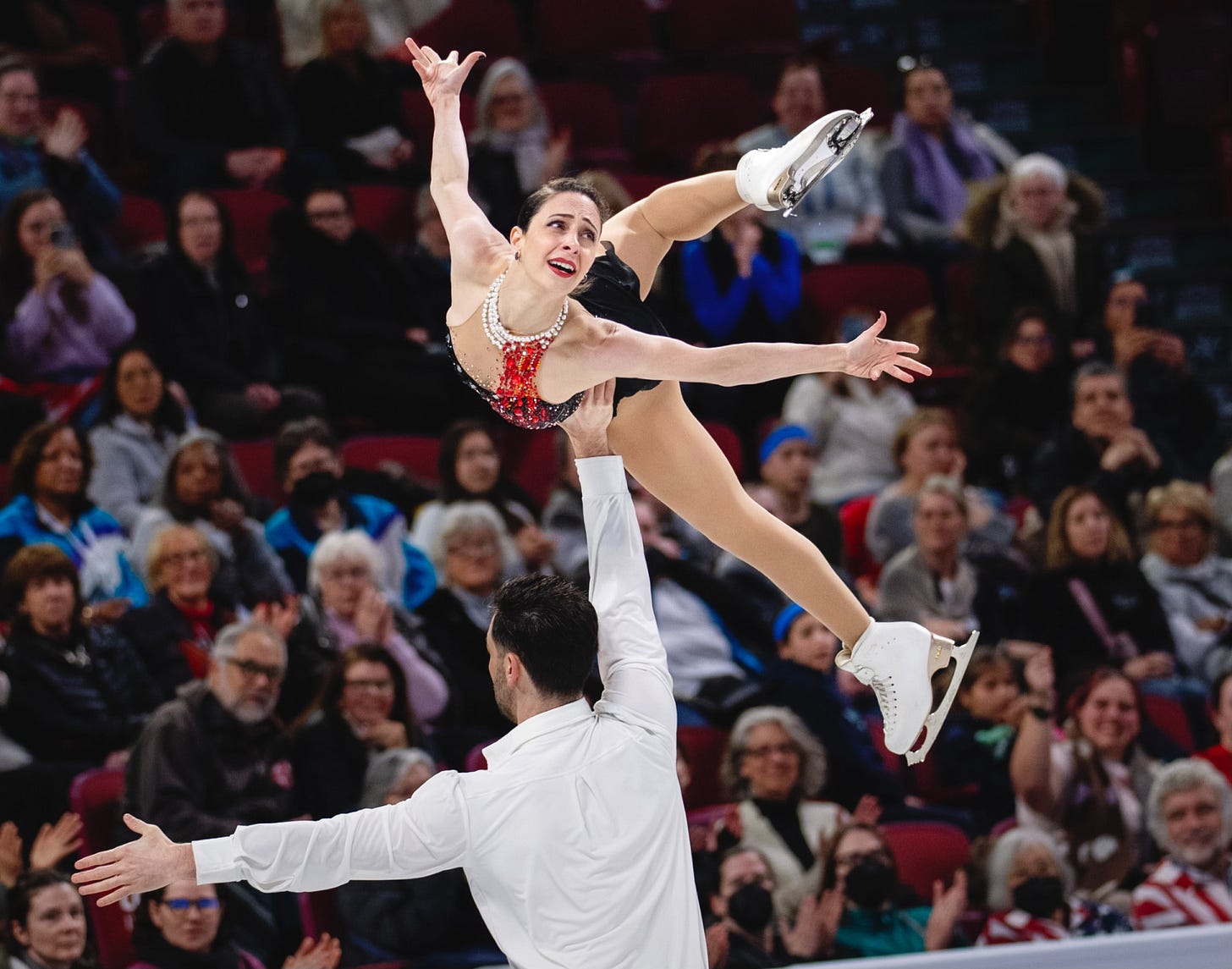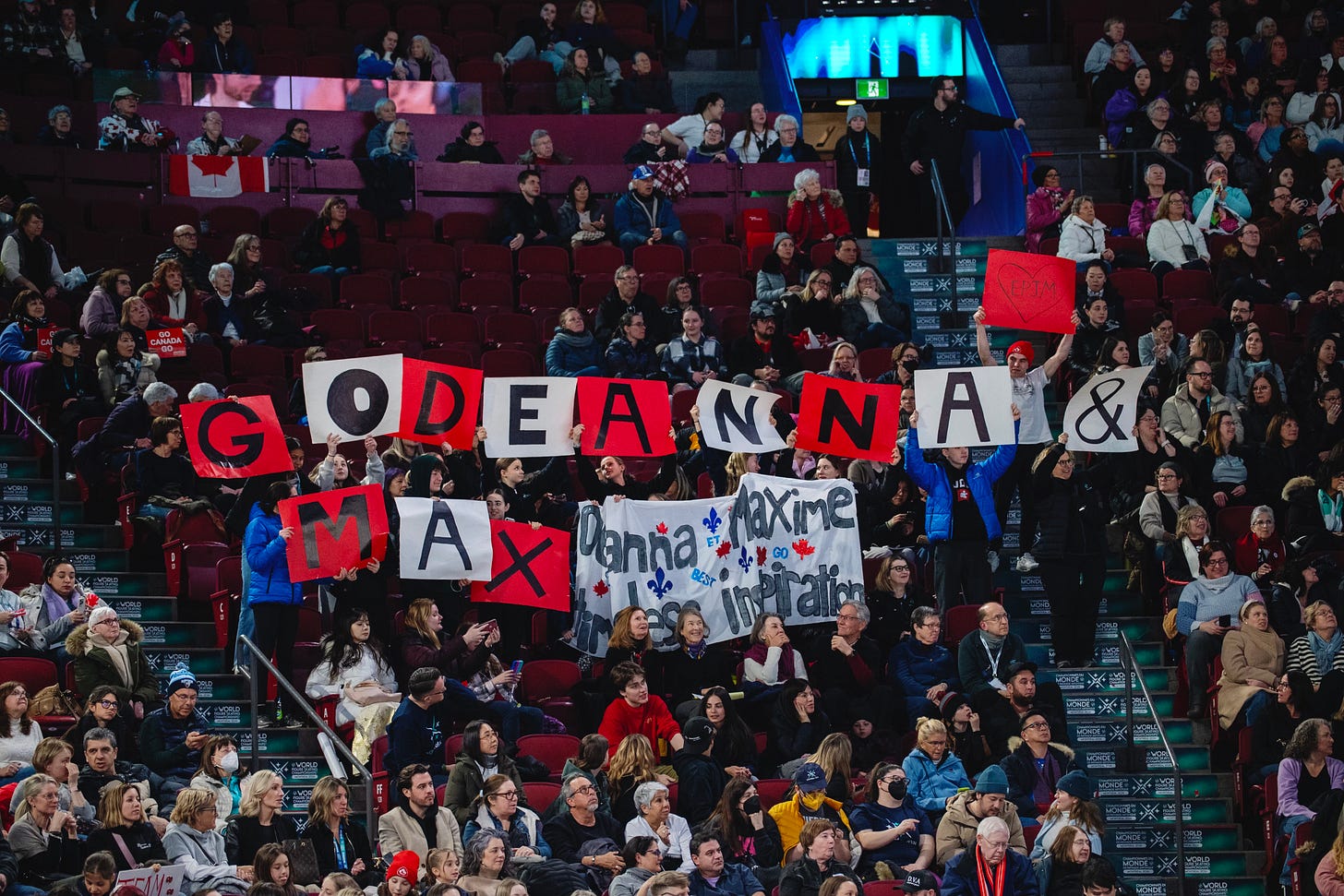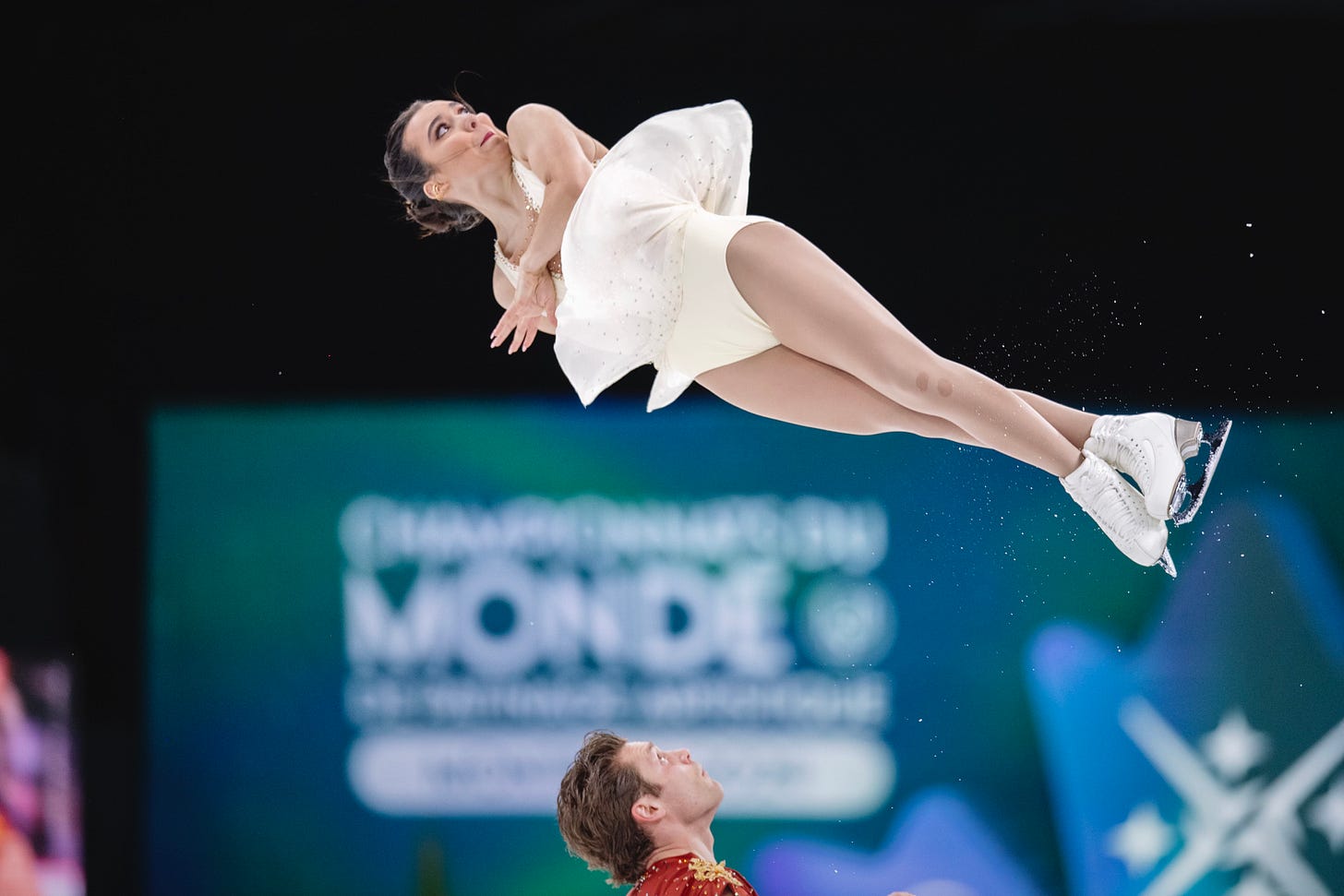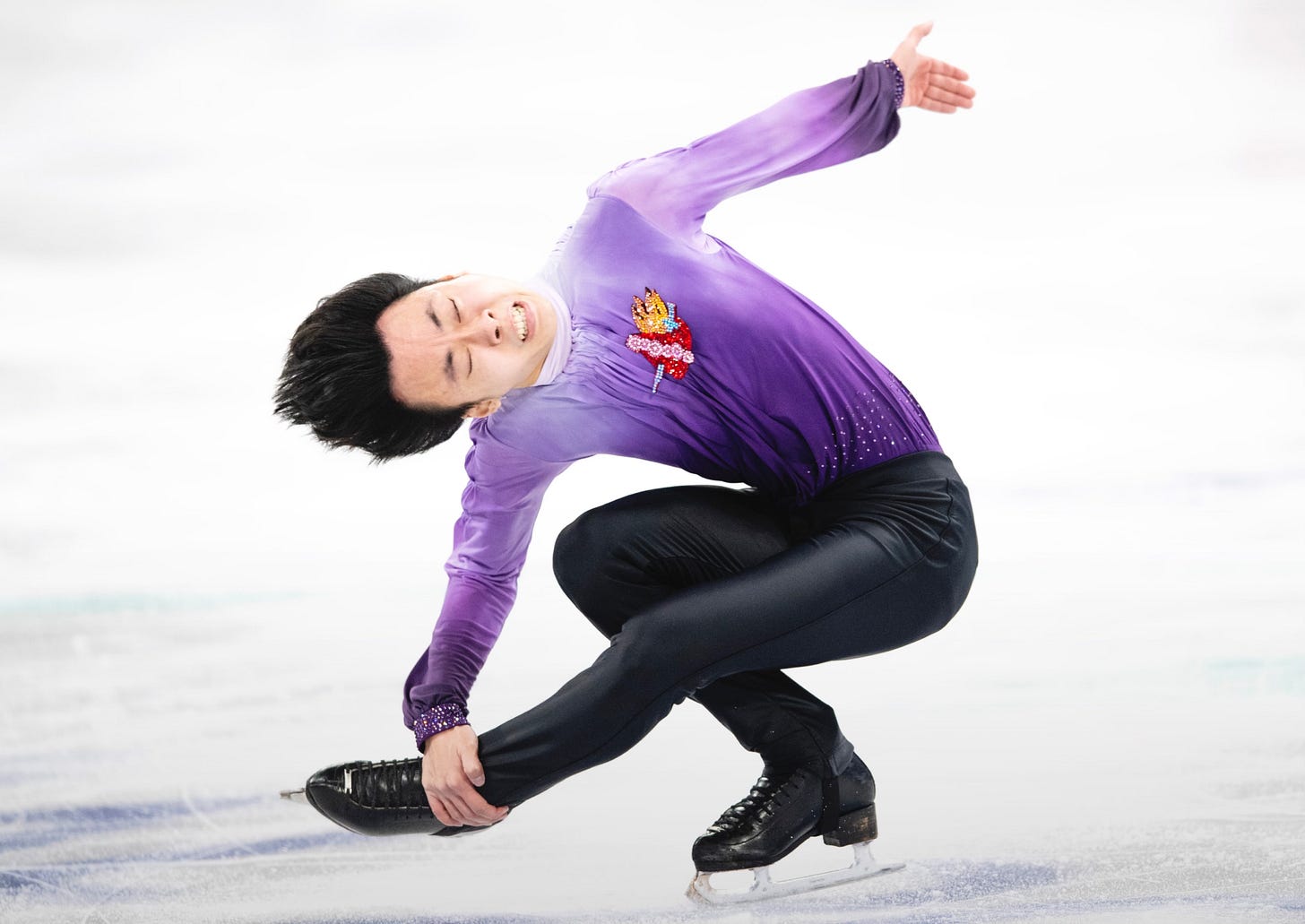Worlds 2024: 'We've got a Hollywood script on our hands'
Deanna Stellato-Dudek and Maxime Deschamps lived out a golden dream in the city they call home. It's one of the most remarkable stories figure skating has ever seen.

MONTREAL — Amidst the deafening cauldron of noise at the Bell Centre, after all they had wrought on a storybook night in Montreal, Maxime Deschamps needed just three words to sum up the magic he and Deanna Stellato-Dudek were able to weave in front of an adoring home crowd.
“We did it!” the 32-year-old Deschamps exclaimed at his 40-year-old partner, who added an emphatic three-word phrase of her own: “Oh, my God!”
Those who were there on Thursday won’t soon forget the night they saw Stellato-Dudek and Deschamps become world pairs champions. They are just the third Canadians to win a global crown on home soil this century, joining Patrick Chan in 2013 in London, Ontario, and another pairs team, Jamie Sale and David Pelletier, in Vancouver in 2001. They’re also the first Canadian pair team to win a World title since Meagan Duhamel and Eric Radford in 2015 and 2016. According to the International Skating Union, Stellato-Dudek became the oldest female world champion in history as well, a badge of honour she is most happy to wear.
“Forty is the new 20 … that’s what I’d like say,” she said afterward to a chorus of laughs at the post-event press conference. “It’s not anything I really set out to do when I came back to skating, but I knew if I worked to accomplish my dreams, it would inevitably occur, because I’m the oldest everywhere. It’s something I carry with pride; I’m very proud of it. I hope a lot of other athletes stay around a lot longer. I hope it encourages people to not stop before they’ve reached their potential. And I hope it transcends into other areas, not just in sports. But also in other areas of life, like work and professional careers.”
In more than 30 years of covering this sport, this may well be the most remarkable story I’ve ever witnessed. While that might seem like a rather large dollop of hyperbole, hear me out. When they joined forces back in 2019, Stellato-Dudek was 35 years old, having just returned to figure skating three years earlier after a 16-year absence from the sport. She crossed the border into Canada, into a new city she has come to see as home, to find the skater who has been her ideal match (as she put it when receiving an ISU Special Achievement Award, “he took a chance on a 35-year-old with a dream”). Deschamps, meanwhile, had gone through eight previous partners, never finishing higher at the senior level than fifth at the Canadian Championships. Outside of a national junior title he won with Vanessa Grenier in 2014, his career had been largely unremarkable (he also suffers from ADHD, or attention deficit hyperactivity disorder, which can affect a person’s ability to focus).
And yet, together they became a remarkable force, two star-crossed skaters who found exactly what they needed in each other. Thursday night, they became World champions on a serious roll toward the 2026 Milan-Cortina Olympics. She had previously stated her biggest goal for them was an Olympic medal. Now they have to be taken seriously as contenders for gold.
As we said, just an amazing, amazing story.
“We have a Hollywood script on our hands here in the making. How did we get here today to perform on home ice in front of friends and family?” said Deschamps. “We both have different stories but in the end, we had a little perseverance and dedication to achieve what we have done. All the experience we have gained in different ways, we have been able to bring together here and that’s what we have been able to do together.
“It’s something I’ll remember for the rest of my life.”
Asked what made Stellato-Dudek the one that helped turn him into a World champion, Deschamps said “she’s a warrior. For her, it’s Olympics every day. It’s all that dedication she has that makes it special.”

Stellato-Dudek and Deschamps came into the free skate on the heels of their best short program of the season, which gave them a nearly four-point lead over defending World champions Riku Miura and Ryuichi Kihara of Japan. It placed an immense amount of pressure on the Canadians, especially with a Bell Centre crowd on hand who wanted a World title for them so badly (“it was the highest pressure we have faced so far,” said Deschamps). But they went out and delivered, with only one obvious mistake and, at the end of the day (night?) it was minor stuff. The rest of the elements, they checked off one by one. By the time they were done with their “Interview with the Vampire” program, which is both intense and dramatic in its presentation, the audience was roaring its approval (how loud was it? Loud enough to touch off a noise warning on my Apple Watch. True story!).
When their score for the free skate (144.08) went up, they knew they were almost there, with Stellato-Dudek bursting into tears while saying “I can’t believe it.” While the Japanese edged them by a hair in the free skate, the Canadians’ overall total of 221.56 made them World champions.

“Today I felt a little bit sick and not myself,” admitted Stellato-Dudek. “So I put my coaches (Josee Picard and Julie Marcotte) and Max through a really hard time before the program, but I wasn’t sure how I was going to do it. Our warmup was really terrible. So I just want to thank my coaches and my partner, because they said to me ‘you’re going to do this. You’re going to go out there and fight and give it everything you’ve got.’ We trained really hard for this, and that’s how we were able to get through that program and accomplish everything. The audience today carried us through the second half of the program. To do it in front of our family and friends … I really didn’t want to let anybody down. This is, for me, really a dream come true.”
Perhaps now, there is just one question left to be asked: Who gets to play Deanna and Max in the movie? Because there sure as hell needs to be one. It’s Hollywood stuff, indeed.
That title, combined with the eighth-place finish by Lia Pereira and Trennt Michaud, assured Canada will retain three pairs spots for 2025 Worlds in Boston. While Pereira and Michaud fell two rungs from their sixth-place finish a year ago in Japan, the competition here may well have been decidedly tougher. They also didn’t exactly have the free skate they would have liked, with a fall by Pereira on a throw standing out as the biggest mistake they made. But the duo is heading home to Ontario with their heads held high, and eagerly looking toward what should be a bright future.
“We trained so well the past five weeks and we really put everything that we could into this program. We knew that today was going to be an emotional day, no matter what the circumstance because we love this program so much, and we’ve worked really hard on skating it and being together,” said the 20-year-old Pereira. “The fall on the throw was quite disappointing, just because we hoped for such a great moment, but there’s still a lot of great things I can take away from this. It’s an experience I’ll remember forever.”

Added Michaud: “We’re excited for next season to improve on some things, take some great things away from this season. We had a really good season that we’re super proud of, and we’re just looking forward to building on that.”
The third Canadian team in Montreal, Kelly Ann Laurin and Loucas Ethier, finished 15th in their Worlds debut. Both skaters came to this event battling injuries — he had a “little knee injury,” she was fight hip and back ailments — but took away positive thoughts from their two days at the Bell Centre.
“Gratitude. Really happy that we got the opportunity to skate here, and especially that everyone like all our family, friends and other skating teams or people that we skate with were here,” said the 23-year-old Ethier. “It was really special. I think that’s the (biggest) thing we’re going to bring back.”

Redemption day for Roman
On his first day on the ice at the Bell Centre earlier this week, Canada’s Roman Sadovsky spoke about how he saw these World Championships as his chance for “redemption.” An opportunity to make up for the fact that, even after winning his first national title back in 2020, his followup performance at Four Continents wasn’t nearly good enough to earn him a ticket to Worlds in Montreal (which COVID-19 turned into a bit of a moot point).
Consider it mission accomplished already in that regard.
Right from his opening quad Salchow through a crisply landed triple Axel and triple Lutz-triple toe combination, the 24-year-old Sadovsky was a man in command at the Bell Centre on Thursday. It was Sadovsky’s best short program since the fall of 2022 and, with a score of 86.28, placed him 11th in the segment heading into Saturday night’s free skate final.
“That’s definitely what redemption looks like. That’s what training looks like,” Sadovsky admitted after he was done. “This competition is definitely the most training I’ve had all year and it definitely shows. Not even just in the performance — not necessarily everything is reflected in the performance — but just even on practice. Everything I’m doing is just sharper with more confidence, and it does carry over to some degree with the performance.”
The strange story of his season has been well documented (including here), but Sadovsky didn’t make his debut in this campaign until the Canadian Championships in Calgary (where he placed sixth). He followed that up by finishing 10th at Four Continents, which was plenty good enough to get him to Montreal. The five weeks of training he’s had since then has clearly put him in the right place to contest Worlds.
“I just didn’t have really much of a season this season. I missed it, I definitely missed it. Even last season, the events were pretty populated, but this was the first time I felt like it was real post-COVID,” he explained. “At Four Continents, I didn’t even have my full technical content planned out there. I was going just for double Axel. It’s kind of weird. Four Continents was kind of a primer for here, a prep for this competition. I would have (preferred to) not have it that way, but I really had no choice. It’s the card that I was dealt and I was just proud of what I could put out there.
“I just felt like myself. I felt in the zone and every moment felt really good.”
So, too, did the raucous standing ovation he got when he was done.
“Seeing that recognition from thousands of people … it’s a very validating moment. A close second would be the introduction of my name and just seeing all the energy in the crowd and just trying to absorb that,” he said. “It was like bursting my ear drums, it was so loud. It was so good, so so good.”
He also saw getting the chance to deliver that short program in Montreal as a rather serendipitous moment. The program, skated to “Unconscious” by Charlie Winston, was choreographed in this city by renowned ice dance coach Marie-France Dubreuil and Samuel Chouinard.
“The short program was very special. I actually got it done here in Montreal with Marie-France and Sam Chouinard, so we’ve gone full circle,” he said. “Lots of exploration with different movement. A different movement style on the ice and a different kind of storytelling, which was really exciting for me.
“I went there to get a little bit of an ice dance approach. It was very artistic, a very different approach to storytelling … it was an amazing experience.”

The last two words would also describe Canadian champion Wesley Chiu’s view of his first experience at a World Championships. He currently stands 18th after putting a hand down on his opening quad toe, which caused him to turn the back end of his combination into a double toe (instead of a planned triple). He scored 78.00 points, about six shy of his personal best.
“Overall, I was pretty satisfied with my performance today. A little bobble on the quad toe-triple toe — I had to turn it into a double — but I think that was purely on my nerves, being my first time going out in front of a home crowd,” said Chiu, who celebrated his 19th birthday on Wednesday. “The energy is crazy. After that, I was really able to settle down into my feet and really give it 110 per cent the rest of the way.”
Regardless of that outcome, Chiu — whose parents were in the stands to watch him skate — couldn’t help but look at the day as a special one.
“It’s so special. Worlds doesn’t come to Canada very often so with that, and also being my first Worlds, I think it’s a once in a lifetime opportunity and it’s something I’ll never forget,” he said. “Just so many emotions. Having finished a skate that I was proud of and (having) the fans behind my back … it’s something you dream of as a kid. I’m basically living my dream.”
There’s also another rather important point at play here. The combined placements of Sadovsky and Chiu needs to be no higher than 28 for Canada to retain two men’s spots for 2025 Worlds in Boston. Right now, they’re sitting at 27 (by rule, Chiu’s current standing counts for 16). So there’s likely to be some hand wringing by Skate Canada honchos during Saturday’s free skate. It’s especially important next year, because the Boston Worlds will determine the number of entries each country will get for the 2026 Winter Olympics in Milan, Italy. Meaning Canada wants to send its biggest team possible to Boston next year. So there’s a lot on the line in the free skate.
Meanwhile, at the top of the standings, it would seem the medal winners have essentially been decided here, just not the order. Two-time defending champion Shoma Uno of Japan took a large step toward a third title with a flawless skate that earned him a score of 107.72. That put Uno a little more than a point in front of rising Japanese star Yuma Kagiyama (106.35), while Ilia Malinin, the “quad God” from the United States, is right behind in third (105.97). They’re the only men who cracked triple digits on Thursday, and Saturday’s free skate should be quite the showdown for the title.




